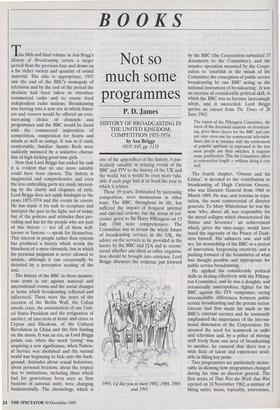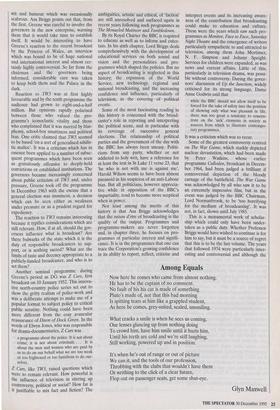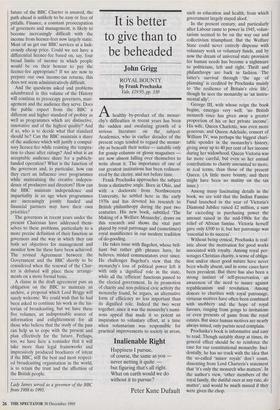BOOKS
Not so much some programmes
P. D. James HISTORY OF BROADCASTING IN THE UNITED KINGDOM: COMPETITION 1955-1974 by Asa Briggs OUP, £45, pp. 1133 This fifth and final volume in Asa Brigg's History of Broadcasting covers a larger period than the previous four and draws on a far richer variety and quantity of sound material. The title is appropriate; 1955 saw the end of the BBC's monopoly of television and by the end of the period the decision had been taken to introduce commercial radio and to create local independent radio stations. Broadcasting was moving into a new era in which listen- ers and viewers would be offered an ever- increasing choice of channels and programmes and the BBC would be faced with the commercial imperatives of competition, competition for hearts and minds as well as ratings. It was as if staid, comfortable, familiar Auntie Beeb were suddenly menaced by a seductive chorus- line of high-kicking good-time girls.
Now that Lord Briggs has ended his task it is evident that no one more suitable could have been chosen. The history is magisterial and comprehensive and even the less enthralling parts are made interest- ing by the clarity and elegance of style. Lord Briggs does not apply hindsight to the years 1955-1974 and the events he covers. He has made it his task to recapture and interpret the past in the light, not of today, but of the policies and attitudes then pre- vailing and has let the people who are part of this history — not all of them well- known or famous — speak for themselves. This interest in people rather than systems has produced a history which avoids the blandness of a mere chronicle, but in which his personal judgment is never allowed to intrude, although it can occasionally be detected by a perceptive reading of the text.
The history of the BBC in these momen- tous years is set against national and international events and the social changes at home which broadcasting reflected and influenced. These were the years of the erection of the Berlin Wall, the Cuban missile crisis, the assassination of one Unit- ed States President and the resignation of another, of race-riots at home and crises in Cyprus and Rhodesia, of the Cultural Revolution in China and the first landing on the moon. It was an era, as Lord Briggs points out, when the word 'young' was acquiring a new significance, when Nation- al Service was abolished and the second world war beginning to fade into the back- ground. Attitudes about sexual behaviour, about personal freedom, about the respect due to institutions, including those which had for generations been seen as firm bastions of national unity, were changing fundamentally. The chronology, which is one of the appendices of the history, is par- ticularly valuable in relating events of the BBC and ITV to the history of the UK and the world, but it would be even more valu- able if each page had at its head the year to which it relates.
These 19 years, dominated by increasing competition, were momentous in other ways. The BBC, throughout its life, has suffered the impact of frequent internal and external reviews, but the terms of ref- erence given to Sir Harry Pilkington on 13 July 1960 were comprehensive. The Committee was to review the whole future of broadcasting services in the UK, the advice on the services to be provided in the future by the BBC and ITA and to recom- mend whether any third or other organisa- tion should be brought into existence. Lord Briggs discusses the evidence put forward `1995, I'd like you to meet 1992, 1989, 1993 and 1991.' by the BBC (the Corporation submitted 37 documents to the Committee), and the massive operation mounted by the Corpo- ration to 'establish in the minds of the Committee the conception of public service broadcasting by one BBC acting as the national instrument of broadcasting'. It was an exercise of considerable political skill, in which the BBC was to become increasingly adept, and it succeeded. Lord Briggs quotes an extract from The Times of 28 June 1962:
The report of the Pilkington Committee, the latest of the decennial inquests on broadcast- ing, gives three cheers for the BBC and can- not raise even one for commercial television. Since this is at variance with the conferment of popular applause as expressed in the way most people use their switches, it requires some justification. This the Committee offers at remorseless length — without doing it very well.
The fourth chapter, 'Greene and his Critics', is devoted to the contribution to broadcasting of Hugh Carleton Greene, who was Director General from 1960 to March 1969. He was, and remains in repu- tation, the most controversial of director generals. To Mary Whitehouse he was the man 'who, above all, was responsible for the moral collapse which characterised the Sixties and Seventies', an achievement which, given the time-range, would have taxed the ingenuity of the Prince of Dark- ness himself. His admirers saw, and still see, his stewardship of the BBC as a period of innovation, burgeoning creativity, and a pushing forward of the boundaries of what was thought possible and appropriate for public service broadcasting.
He applied his considerable political skills in dealing effectively with the Pilking- ton Committee, and he was a doughty, and occasionally unscrupulous, fighter for the BBC against the ITV companies, seeing irreconcilable differences between public service broadcasting and the private sector. Greene had first made his mark in the BBC's external services and he constantly emphasised the importance of the interna- tional dimension of the Corporation. He stressed the need for teamwork in radio and television and, by a policy of moving staff freely from one area of broadcasting to another, he ensured that there was a wide field of talent and experience avail- able in filling key posts.
Two programmes are particularly memo- rable in showing how programmes changed during his time as director general. The first series of That Was the Week that Was opened on 24 November 1962; a mixture of biting satire, music, topicality, irreverence, wit and humour which was occasionally scabrous. Asa Briggs points out that, from the first, Greene was careful to involve the governors in the new enterprise, warning them that it would take time to establish itself. It would be interesting to have Greene's reaction to the recent broadcast by the Princess of Wales, an interview which was bound to be of huge national and international interest and almost cer- tainly highly controversial. So far from the chairman and the governors being informed, considerable care was taken to keep both them and the Palace in the dark.
Reaction to TW3 was at first highly favourable and by the tenth programme the audience had grown to eight-and-a-half million. But opinions rapidly polarised between those who valued the pro- gramme's iconoclastic vitality and those who complained that it was marred by blas- phemy, school-boy smuttiness and political bias. One critic claimed that TW3 seemed to be based 'on a sort of generalised nihilis- tic malice'. It was a criticism which has in essence been applied to a number of subse- quent programmes which have been seen as gratuitously offensive to deeply-held convictions or established institutions. The governors became increasingly concerned about public criticism of TW3 and, under pressure, Greene took off the programme in December 1963 with the excuse that a general election was imminent, a decision which can be seen either as weakness under pressure or as a prudent regard for expediency. The reaction to TW3 remains interesting because it typifies considerations which are still relevant. How, if at all, should the gov- ernors influence what is broadcast? Are there bulwarks of the state which it is the duty of responsible broadcasters to sup- port, or is nothing sacred? What are the limits of taste and decency appropriate to a publicly-funded broadcaster, and who is to set them?
Another seminal programme during Greene's period as DG was Z Cars, first broadcast on 10 January 1952. This innova- tive north-country police series set out to show the gritty realism of police-work and was a deliberate attempt to make use of a Popular format to subject policy to critical public scrutiny. Nothing could have been more different from the cosy avuncular reassurance of Dixon of Dock Green. In the words of Elwyn Jones, who was responsible for drama-documentaries, Z Cars was
a programme about the police. It is not about crime; it is not about criminals.... It is about the men and women who are paid by us to do on our behalf what we are too weak or too frightened or too fastidious to do our- selves.
Z Cars, like TW3, raised questions which were to remain relevant. How powerful is the influence of television in stirring up controversy, political or social? How far is it justifiable to mix fact and fiction? The ambiguities, artistic and ethical, of 'faction' are still unresolved and surfaced again in recent years following such programmes as The Monacled Mutineer and Tumbledown.
By its Royal Charter the BBC is required to educate as well as to inform and enter- tain. In his sixth chapter, Lord Briggs deals comprehensively with the development of educational services on both sound and vision and the personalities and pro- grammes which shaped the policies. But no aspect of broadcasting is neglected in this history; the expansion of the World Service, new technology, regional and national broadcasting, and the increasing confidence and influence, particularly of television, in the covering of political events.
Some of the most fascinating reading in this history is concerned with the broad- caster's role in reporting and interpreting the political scene, and in particular with its coverage of successive general elections. The relationship of political parties and the government of the day with the BBC has always been uneasy. Politi- cians from any party, whether or not addicted to holy writ, have a reference for at least the text in St Luke 11 verse 23, that `he who is not with me is against me'. Harold Wilson seems to have been almost paranoid in his suspicion of an anti-Labour bias. But all politicians, however apprecia- tive while in opposition of the BBC's impartiality, tend to become more sceptical when in power.
Not least among the merits of this history is that Asa Briggs acknowledges that the raison d'etre of broadcasting is the quality of the output. Programmes and programme-makers are never forgotten and, in chapter three, he focuses on pro- grammes of particular interest and signifi- cance. It is in the programmes that one can trace the Corporation's growing confidence in its ability to report, reflect, criticise and interpret events and its increasing aware- ness of the contribution that broadcasting could make to education and culture. These were the years which saw such pro- grammes as Monitor, Face to Face, Saturday Night Theatre and the emergence of writers particularly sympathetic to and attracted to television, among them John Mortimer, N. F. Simpson and Johnny Speight. Services for children were expanded, as was news and current affairs. Little of this, particularly in television drama, was possi- ble without controversy. During the gover- nors' discussion of Up the Junction, widely criticised for its strong language, Dame Anne Godwin said that
while the BBC should not allow itself to be forced for the sake of safety into the position of showing only what was pleasant in life, there was too great a tendency to concen- trate on the 'sick' elements in society as sources from which to illustrate contempo- rary programmes.
It was a criticism which was to recur.
Some of the greatest controversy centred on The War Game, which starkly depicted nuclear devastation, which had been made by Peter Watkins, whose earlier programme Culloden, broadcast in Decem- ber 1964, had been judged a brilliant if controversial depiction of the bloody carnage of the battlefield. The War Game was acknowledged by all who saw it to be an extremely impressive film, but in the event was judged by the BBC Chairman, Lord Normanbrook, to be 'too horrifying for the medium of broadcasting'. It was not, in fact, shown until July 1985.
This is a monumental work of scholar- ship which could only have been under- taken as a public duty. Whether Professor Briggs would have wished to continue is for him to say, but it must be a source of regret that this is to be the last volume. The years that followed 1974 were particularly inter- esting and controversial and although the future of the BBC Charter is assured, the path ahead is unlikely to be easy or free of pitfalls. Finance, a constant preoccupation of governors and management, is likely to become increasingly difficult with the income from licence-fees now largely static. Most of us get our BBC services at a ludi- crously cheap price. Could we not have a differential licence-fee based on, say, four broad limits of income in which people would be on their honour to pay the licence-fee appropriate? If we are now to prepare our own income-tax returns, this does not seem administratively difficult.
And the questions asked and problems adumbrated in this volume of the History will continue to preoccupy governors, man- agement and the audience they serve. Does the public expect from the BBC a different and higher standard of probity as well as programmes which are distinctive, innovative and of the highest quality? And if so, who is to decide what that standard should be? Can the BBC maintain a share of the audience which will justify a compul- sory licence-fee while resisting the tempta- tion to chase after ratings? And what is an acceptable audience share for a publicly- funded operation? What is the function of the governors and, in particular, how can they exert an influence over programmes while maintaining the creative indepen- dence of producers and directors? How can the BBC maintain independence and impartiality in an age when programmes are increasingly jointly funded and financial partners may have their own priorities?
The governors in recent years under the present Chairman have addressed them- selves to these problems, particularly to a more precise definition of their function as governors and the way in which they can both set objectives for management and monitor how far these have been achieved. The revised Agreement between the Government and the BBC shortly to be considered when the renewal of the Char- ter is debated will place these arrange- ments on a more formal basis.
A clause in the draft agreement puts an obligation on the BBC to maintain an archive, a proposal which Lord Briggs will surely welcome. We could wish that he had been asked to continue his work as the his- torian of broadcasting, but we have these five volumes, an indispensable source of information and enlightenment for all those who believe that the study of the past can help us to cope with the present and plan effectively for the future. Perhaps, too, we have here a reminder that it will take more than legal frameworks and impressively produced brochures of intent if the BBC, still the best and most respect- ed broadcasting organisation in the world, is to retain the trust and the affection of the British people.
Lady James served as a governor of the BBC from 1988 to 1995.




















































 Previous page
Previous page